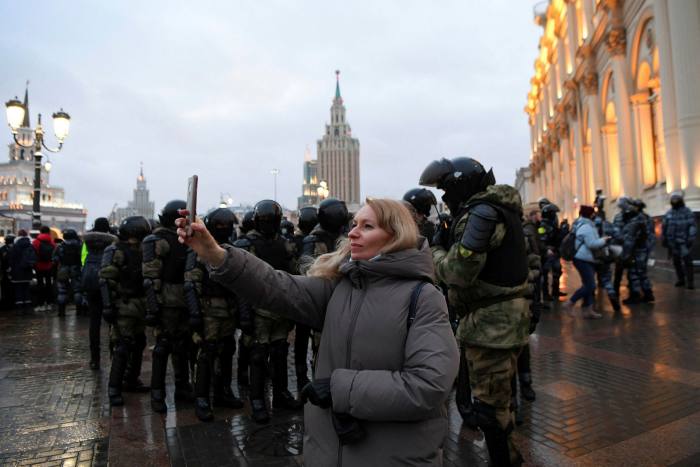[ad_1]
The recent move by Russia’s internet censor to start slowing Twitter was a sign of Moscow’s resolve to take on Silicon Valley and marked a test of its new infrastructure for a “sovereign internet†less dependent on western tech companies.
Exerting greater control over foreign social networks — the biggest outlet for dissent in Russia — has become more pressing for the Kremlin after supporters of jailed opposition activist Alexei Navalny used them to organise nationwide protests in January.
Moscow has threatened to ban Twitter this month if it does not delete 3,168 posts dating back to 2017 that it says encourage illegal activities. The warning came after President Vladimir Putin said society would “collapse from the inside†if the internet did not “submit to formal legal rules and the moral laws of societyâ€.
But action against Big Tech poses its own risks. The knock-on effect of last month’s Twitter slowdown meant that within hours the websites of the Kremlin, Russia’s parliament and several government agencies went offline — including that of the censor itself, Roskomnadzor — highlighting Moscow’s reliance on foreign internet infrastructure.
The sovereign internet, effectively a parallel web run entirely on Russian servers, is meant to have the technology to restrict access selectively to banned content without the risk of collateral damage. Russia’s censors say they have learnt their lessons from a disastrous attempt to ban messaging app Telegram in 2018, which took out more than 16m unrelated sites while Telegram, still easily accessible, increased its audience from 10m to 30m.

The restrictions against Twitter are the first significant use of the sovereign internet through a technology known as deep packet inspection, which theoretically gives censors the ability to filter individual pages without taking thousands of others with them.
“It’s a step forward for the state to have control over all of their internet infrastructure, even if they still don’t have it completely. It’s not just about ad hoc control of the content, calling [companies] to say, ‘Could you please block this website’. Now they have these levers of control,†said Alena Epifanova, a researcher at the German Council on Foreign Relations in Berlin.
Initial results show there may be kinks in the system. The slowdown also appeared to hit several websites whose domains use the “t.co†that Twitter employs for shortened web addresses.
“They still can’t control every server which Twitter uses because they have different servers for their content delivery network all around the world,†Epifanova said.
The threat to ban social networks outright — as Moscow did with LinkedIn in 2016 — has not spurred Silicon Valley’s giants to comply with Russia’s laws on data localisation and banned content.
Nor are Facebook and Google vulnerable to the kind of pressure Russia has exerted on local technology companies. Russian search engine Yandex gave the Kremlin an effective veto over its governance if US-based investors tried to take control. Streaming platform ivi reportedly shelved plans for an initial public offering after lawmakers moved to limit online entertainment sites’ foreign funding along similar lines.
Unable to gain a strong foothold on platforms such as YouTube, where Navalny has millions more subscribers than state television networks, Russian lawmakers are vowing to ban sites that “discriminate†against pro-Kremlin media.
“Western media and society tries to present it in a very politically biased way, that we’re going to block everything. But actually, we’re the victim here,†Anton Gorelkin, a member of parliament who is preparing a comprehensive bill to regulate foreign tech companies, said in an interview. “Foreign companies work here, make billions but don’t pay taxes or co-operate with our entirely reasonable demands.â€

Russia hopes the threat of a ban backed by its new technology will finally compel Silicon Valley to comply with its laws. Roskomnadzor said last week that Twitter had removed a third of the posts it flagged, though it complained the site was doing so at an “unsatisfactory tempoâ€.
Gorelkin pointed to Apple’s compliance with a new law he authored that requires smartphone manufacturers to pre-install a slate of Russian apps, including Yandex’s competitors to Google’s email and cloud storage as well as long-forgotten messengers such as ICQ.
“We have a highly competitive market. If some major western company decides to leave our market at some point, nothing disastrous will happen,†Gorelkin said. “The market will be divided between the other players.â€
Though Russia is one of the few countries to have strong local competitors to Silicon Valley in Yandex’s search and Mail.ru’s social media, they remain exceptions in what remains a western-dominated market.
If the sovereign internet makes accessing western sites sufficiently cumbersome, however, it may have the desired effect, said Sergei Sanovich, a post-doctoral researcher at Princeton University’s Center for Information and Technology Policy.
“There is one market principle that the Russian government respects, though, and it is that the consumer is always right. This is what differentiates them from Soviet predecessors and makes them similar to the Chinese,†Sanovich said.
“They interpret it in the most cynical way possible: only the average consumer matters and they will consume whatever is offered to them as long as it is reasonably entertaining and very easy to access,†he added.
“They correctly understand that with a glut of information, very low barriers to access one platform could give an alternative platform that they control a huge boost.â€
[ad_2]
Source link





